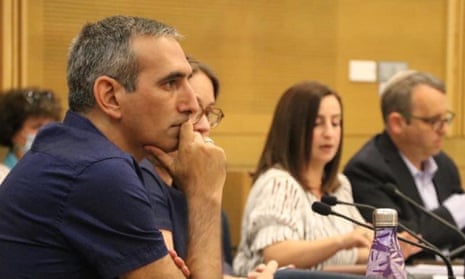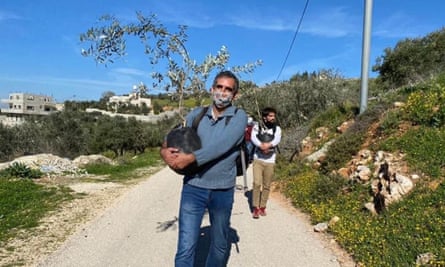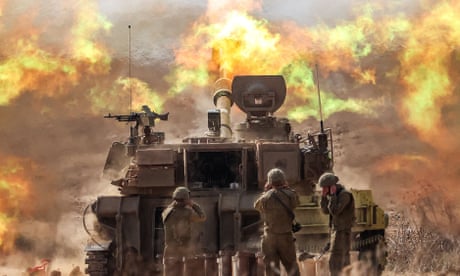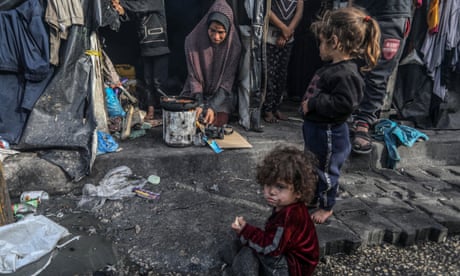Extract from The Guardian

Avi Dabush at an Israeli Knesset committee meeting in 2021. He will speak in Sydney and Melbourne on the path to peace in Israel and Palestine.
Rabbis for Human Rights director Avi Dabush sees a ceasefire as consistent with values of peace and human rights
Tue 2 Apr 2024 01.00 AEDT
Last modified on Tue 2 Apr 2024 08.12 AEDTAvi Dabush felt as if he was “in a nightmare” and worried “maybe this is the end” when his family spent eight hours hiding from Hamas militants in Kibbutz Nirim in southern Israel.
So the executive director of the organisation Rabbis for Human Rights speaks with authority when he says the 7 October attacks have caused “a very deep and open wound” on Israeli society.
But Dabush, who arrived in Australia this week to give lectures on the path to peace, also strongly supports a ceasefire and doubts Israeli military force will bring lasting peace.
“I believe this is one of the biggest threats right now: that people, even though we are 170 days after the beginning, still believe that only with force we can make a new and better reality. And I don’t believe that.”
If the Israeli government flatly dismisses criticism from Australia and other allies, Dabush warns, “we will get ourselves into a place that we feel that we are right 100% and all the world doesn’t understand or is against us. It’s a very bad place to be.”
‘Radical dehumanising from both sides’
Dabush, his wife and her children, aged 12 and 15, took cover early on 7 October when they heard sirens warning of rockets fired from Gaza.
“So we ran to the shelter, the four of us and our dog,” he says, recalling that at one point he could hear Hamas militants “beside our window shouting commands”.
“We were there for eight hours till the army, the IDF, came into our house to clear it. It was very scary.”
Dabush says five people were killed in his kibbutz and five others were taken hostage. He prays for a ceasefire and the release of hostages.
He believes it would be good – for Israelis and Palestinians – if Hamas can be broken as a military force and no longer rule Gaza, but is also wary of the wider effects of Israel’s military operations.
“We know, as it was in Protective Edge [the 2014 war] and other rounds, that more and more people in Gaza really hate Israel because of their experience: their houses are ruined, they are starving, their family members are dead. So it’s not bringing hope.”
Dabush calls out “very deep and radical dehumanising from both sides”, including by Israelis who might portray a Palestinian child as a potential Hamas sympathiser or future militant. The 7 October attack, meanwhile, “shows us a very deep dehumanising of the Israelis or the Jews on the border”.
A ceasefire and two states
The Australian government has repeatedly condemned the Hamas attacks, but has also spoken out about the “dire” humanitarian crisis in Gaza and urged Israel to avoid a “devastating” ground offensive in Rafah where Palestinian civilians are sheltering.
The Israeli prime minister, Benjamin Netanyahu, said two weeks ago: “To our friends in the international community I say: ‘Is your memory so short? So quickly did you forget October 7, the most terrible massacre committed against Jews since the Holocaust?’”
Dabush – who will address events in Sydney on Tuesday and in Melbourne next week – says it is “OK and also important” for friends to “speak frankly with Israel”.
Israel’s security, he says, should be accompanied by human rights for Palestinians “and we must get help from Australia, from our allies, to go down that route”.
His organisation, Rabbis for Human Rights, sees a ceasefire as consistent with values of peace, human rights, justice and equality.
“We believe that it’s not about Jews against Arabs, or Israelis against Palestinians, or vice versa. It’s about the people who believe in those values against the people who do not.”

Dabush says while Rabbis for Human Rights does not have a position on the specific model for a diplomatic solution, “we are against occupation because this is a root of so many violations of human rights”.
He is also part of a separate movement called A Land For All that supports a future confederation of two states.
“Its philosophy is against separation because we understand that we must live, from the river to the sea, Jews and Arabs together,” Dabush says. “We support the notion of two states but with open borders like the European Union.”
Michael Chaitow, executive director of the New Israel Fund Australia which is sponsoring Dabush’s visit, says he is “proud to partner with leaders like Avi who, despite facing the horrific violence and senselessness of October 7th, are committed to peace-building as the only path out of this conflict”.


No comments:
Post a Comment